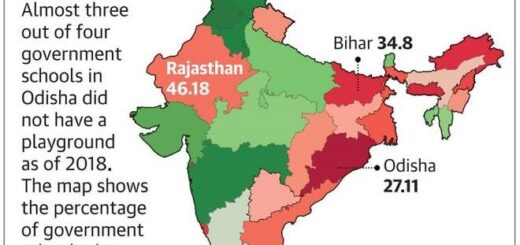National Current Affairs – UPSC/IAS Exams- 7th June 2019
New species of plants and animals
Topic: Environment and Ecology
In News: Scientists and taxonomists have documented 596 new species of flora and fauna from India in the year 2018. The details of the discoveries were made public by the Botanical Survey of India (BSI) and the Zoological Survey of India (ZSI) in the publications Plant Discoveries 2018 and Animal Discoveries 2018 .
More on the Topic
- Of the 596 species, 372 come under fauna (311 invertebrates and 61 vertebrates). The newly identified 224 plant species include seed plants, pteridophytes, bryophytes, fungi and lichen.
- About 31% of the plant species were discovered in the Himayalas. In the case of animals, the Western Ghats remained a biological hotspot from where about 50% of the species were found.
- The plants discovered this year includes close wild relatives of many potential horticulture, agriculture, medicinal and ornamental plants.
- Modern taxonomic tools, like DNA analysis, helped in the discovery of frogs and reptiles.
- Kerala recorded the highest number of fauna discoveries with 59 species. West Bengal, a state with both Himalayan and coastal ecosystems, recorded 38 and Tamil Nadu recorded 26.
- With these new discoveries, the updated list of animal species in India has risen to 1,01,681 which is about 6.49% of all the species in the world.
Zoological Survey of India:
- It is India’s apex organization on animal taxonomy.
- Its objective is to promote survey, exploration, research and documentation on various aspects of animal taxonomy in Indian subcontinent.
- It also seeks advancement of knowledge on animal taxonomy.
- It was established in 1916 and headquartered in Kolkata.
- It has been declared as designated repository for National Zoological Collection as per section 39 of the National Biodiversity Act, 2002.
Botanical Survey of India (BSI):
- BSI is the apex research organization under Ministry of Environment and Forests (MoEFCC) for carrying out taxonomic and floristic studies on wild plant resources of country.
- It was established in 1890 with objective to explore plant resources of country and to identify plants species with economic virtues.
- It has nine regional circles situated at different regions of the country.
Source: The Hindu
NITI Ayog
Topic: Polity and Governance
In News: Prime Minister Narendra Modi has approved reconstitution of government think-tank Niti Aayog.
More on the Topic:
- Government of India has replaced the old planning commission started in 1950 with a new institution called NITI Aayog on 1 January 2015.
- It works under the chairmanship of Prime Minister. NITI Aayog (National Institution for Transforming India) will seek to provide a critical directional and strategic input into the development process.
- It focuses on co-operative federalism.
- The centre-to-state one-way flow of policy, that was the hallmark of the Planning Commission era, is now sought to be replaced by a genuine and continuing partnership of states.
- NITI Aaayog is based on the 7 pillars of effective governance – (1) Pro-People (2) Pro-Activity (3) Participation (4) Empowering (5) Inclusion of all (6) Equality (7) Transparency.
- In NITI Aayog, the state governments has an equal role in nation’s development process and NITI Aayog promises the principle of co-operative federalism.
- It’s a platform for monitoring and implementation of all government policies by bringing together various ministries at the center and state level.
- Priorities include upliftment of the poor, marginalized and downtrodden.
- Empower vulnerable and marginalized sections, redressing identity-based inequalities of all kinds – gender, region, religion, caste or class.
Source: The Hindu
National Testing Agency
Topic: Polity and Governance
In News: The National Testing Agency has declared result of National Eligibility cum Entrance Test (UG) – 2019.
More on the topic:
- In pursuance of the Budget Announcement 2017-18, the Union Cabinet, in November 2017, approved creation of the National Testing Agency (NTA) as an autonomous and self-sustained premier testing organization to conduct entrance examinations for Higher Education Institutions (HEIs) in the country.
- NTA will be chaired by an eminent educationist appointed by MHRD.
- The CEO will be the Director General to be appointed by the Government.
- There will be a Board of Governors comprising members from user institutions.
- The Director General will be assisted by 9 verticals headed by academicians/ experts.
- Examinations will be conducted in online mode at least twice a year to give adequate opportunity to candidates to bring out their best.
- In order to serve requirements of the rural students, it will locate centres at sub-district and district level and as far as possible it will undertake hands-on training to the students.
- National Testing Agency (NTA) would conduct the national-level examinations — NET, NEET, JEE (Mains) that were earlier organised by the Central Board of Secondary Education (CBSE).
- The tests would be computer-based.
- NET, a qualifying test for admission in higher educational institutions in the country, is conducted by NTA.
- The NTA would also conduct National Eligibility cum Entrance Test Common Management Admission Test (CMAT) and Graduate Pharmacy Aptitude Test (GPAT).
Source: The Hindu
Ebb in the Yamuna flow
Topic: Environment and Ecology
In News: Both experts and a Monitoring Committee appointed by the National Green Tribunal state that less flow in the Yamuna river is one of the main reasons for pollution.
More on the Topic:
- Three plans to augment the Yamuna’s volume and flow have either missed deadlines or are progressing very slowly a National Mission for Clean Ganga-commissioned study on minimum flow needed in the Yamuna, a project to rejuvenate waterbodies and recharge groundwater, and a plan to build an off-channel reservoir to store water along the river.
- The Yamuna is one of the “most polluted rivers in the world”, especially in Delhi, and it is getting more polluted.
- “Presently the pollution in the Yamuna is far in excess and no impact on river quality is likely unless there a minimum environmental flow.
- Pollutants will be diluted if there is enough flow in the river.
Way forward:
- On May, 2015, a Principal Committee, in its report submitted to the NGT, had recommended a host of measures including creating off-river reservoirs along the floodplain to increase the river’s flow.
- Such reservoirs would be filled by diverting excess water from the Yamuna during the monsoon and allowed to percolate, thus recharging the groundwater and in turn helping the river’s flow.
- This recommendation should be moved forward with a clear political will in action to mitigate the issue.
Source: The Hindu
African Union suspends Sudan
Topic: International Relations
In News: The African Union suspended Sudan “with immediate effect”, days after a deadly crackdown by security forces on protesters demanding civilian rule.
More on the Topic:
- The pan-African organisation’s Peace and Security Council said the suspension would remain in force until Sudan’s military rulers handed over power to a transitional, civilian-led administration.
- The African Union suspension means Sudan cannot take part in any meetings or benefit from financial or other AU-linked programme
- The AU could take further punitive action against Sudan, such as sanctions, and call on the UN to take similar measures.
Background:
- Sudan’s long-time president Omar al-Bashir has been removed from office and arrested following months of protests against Bashir’s regime.
- With this act three-decade rule of Sudanese president Omar Hassan al-Bashir has ended.
- Since independence in 1956, the North African nation has seen sectarian violence, famines and political instability, the latest coup toppling Bashir being the fifth such forcible takeover.
- Over three decades, Bashir and his military clique had used several tactics, from aligning with Islamists and banning political parties to suppressing dissent and unleashing paramilitaries against defiant regions, to stay in power.
- Protests are still going on in Sudan despite 30-year rule of Omar al-Bashir replaced by military-led transitional council.
- Protesters are looking for democratic government in the country as they believe military rule completely phased out. Protesters said that just five or six people have been replaced by another five or six people and regime remained the same.
- But the recent economic crisis, especially after South Sudan split away with three-fourths of the oilfields, broke the regime’s back. Now, Mr. Bashir has quit.
- The army should respect their demand and resolve the impasse. It’s time to replace the oppressive regime he built, with a much more inclusive, responsive and democratic civilian government.
Source: The Hindu
Global Disability Summit
Topic: Social Justice
In News: Social Justice and Empowerment minister will parcipate 2nd Global Disability Summit in Buenos Aires in Argentina.
More on the Topic:
- The objective of the three-day summit is to deliberate on issues across the world concerning empowerment and inclusion of Persons with Disabilities and to work out a mechanism for enabling them to live an independent and dignified life.
- The first-ever Global Disability Summit was held at London, United Kingdom (UK) in 2018. It was hosted by UK Department for International Development (UK DFID), along with the co-hosts International Disability Alliance (IDA) and Government of Kenya.
- The Global leaders attending the summit express their commitments towards eliminating stigma and discrimination against PwDs and to work towards promoting inclusive education, economic empowerment, technology and innovation in assistive devices, data desegregation etc. for them.
Source: The Hindu
First trading programme to combat particulate air pollution
Topic: Environment and Ecology
In News: Gujarat Chief Minister launched India’s first trading programme to combat particulate air pollution on World Environment Day 2019, which has air pollution as its theme.
More on the Topic:
- The programme is a market-based system where the government sets a cap on emissions and allows industries to buy and sell permits to stay below the cap.
- Under the cap and trade system, the regulator first defines the total mass of pollution that can be put into the air over a defined period by all factories put together.
- Then, a set of permits is created, each of which allows a certain amount of pollution, and the total is equal to the cap.
- These permits are the quantity that is bought and sold. Each factory is allocated a share of these permits (this could be equal or based on size or some other rule).
- After this, plants can trade permits with each other, just like any other commodity on the National Commodity and Derivatives Exchange Limited (NCDEX).
- The reason for trading is that in a cap and trade market, the regulator will measure pollution over a period of time and industries must own enough permits to cover their total emissions.
- Factories who find it very expensive to reduce pollution, will seek to buy more permits. Those who can easily reduce pollution are encouraged to do so because then they have excess permits to sell.
Significance of the Initiative:
- Under existing regulations, every industry has to meet a certain maximum concentration of pollutants when it is operating.
- They are tested occasionally and manually (one or two times a year). However, there is widespread non-compliance across India.
- This is partly because penalties are rarely applied, in large part because they involve punishments such as closing down the entire plant which is not necessarily appropriate for small violations.
- For now, the government has set a cap on concentration of emissions for each industrial unit at 150 microgramme per cubic metre (ug/m3), which is the 24-hour average for emission standard set by the Central government for industrial units.
- Globally, cap-and-trade systems have been used to reduce other forms of pollution, such as programmes that have successfully reduced sulphur dioxide (SO2) and nitrogen oxides (NOx) in the United States. But the Gujarat programme is the first in the world to regulate particulate air pollution.
Source: Down To Earth




















